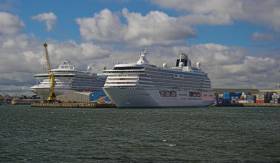Displaying items by tag: Cruise Europe 2016
#CruiseEurope2016 – Cruise Europe’s 2016 conference takes place for the first time in the Irish capital this week (31 May- 2 June). The prestigious three-day conference is to attract over 200 delegates from leading cruise destinations to the event co-hosted by Dublin Port Company and Dublin City Council, writes Jehan Ashmore.
The conference coincides with no fewer than seven cruiseliners calling to the capital this week and in a record breaking season with 113 calls scheduled this year. The cruiseships will bring more than 180,000 visitors to experience the city’s sights and attractions. Among those calls, four are turnaround cruises, which will see passengers travel to Dublin Port to begin their cruise.
A notable highlight of the season so far was the first and only Irish port of call for Disney Cruise Line’s impressive 300m long two funnelled Disney Magic which made a maiden voyage to Irish shores last Thursday bringing 3,650 passengers and crew.
Also making an impression in early May was the return call to Dublin Port of MSC Splendida with 4,600 passengers and crew. At 333m the giant ship operated by MSC Cruises is the 11th longest cruiseship in the world and last summer she became the longest vessel ever to visit the capital. Operated by MSC Cruises the ship has also called to Cobh last year and this season.
According to the Chairman of Cruise Europe, Captain Michael McCarthy of Port of Cork Company, the conference represents an opportunity for delegates to nurture long-term relationships, discuss and debate operational issues, regulatory policies, and to explore new ventures and markets. The conference will also be a great opportunity to showcase Ireland to the cruise industry as a destination to all the major cruise lines and service suppliers of the cruise industry worldwide.
Cruise Europe represents 120 ports and associate members on the continent. The goal of the organisation is to have cruise companies, ports and likely destinations working together in a unified manner to ensure safe and enhanced experiences for cruise passengers.
Cruise Europe Speakers Lining Up for Dublin Conference First
#CruiseEurope – Cruise Europe which has members from within northern and Atlantic Europe will be hosting the organisation’s annual conference in Dublin as previously reported on Afloat. This will be the first time the capital has hosted the major industry sector event.
More than 200 delegates from across Europe will gather for the Cruise Europe Conference between May 31 to June 2 at the Gibson Hotel located in the Point Village. The venue neighbours the port site to where a dedicated purpose built €30m cruise terminal, another first for Dublin was granted permission last year.
The double-cruise berth facility is part of the €230m Alexandra Basin Redevelopment project will be able to handle the world's top ten largest cruise liners, including the 360m long Allure of the Seas.
“We have a great line-up of speakers,” said Jens Skrede, managing director CE, who announced the participation of Miguel Reyna, director commercial development Royal Caribbean Cruises Ltd; Russell Daya, executive director global port operations & developments, itinerary and strategic planning Disney Cruise Line; and Clare Ward, senior commercial planning manager Fred Olsen Cruise Lines. Jens added that “more speakers will be announced later”.
Nigel Lingard will once again moderate the event and there will be plenty of time to network during the social events. After the AGM on Tuesday, there will be an open-top bus tour of the city which will end up at the Guinness Storehouse for a tour, informal dinner and entertainment like only the Irish know how.
The gala evening will take place after the main conference on Wednesday. It will be held at the stunning Royal Hospital Kilmainham which has been a place of caring since 1680.
Cruise Liner Conference to Be Held in Dublin
#CruiseLinersDublin - A major cruise conference being held in Dublin later this year as previously reported on Afloat, is expected to significantly bolster the number of cruise liners visiting this country.
The Irish Examiner writes that Cruise Europe, an organisation representing 120 ports and associate members on the continent, is to hold its annual three-day conference in the capital in June.
Cruise Europe’s goal is to have cruise companies, ports and likely destinations working together in a unified manner to ensure safe and enhanced experiences for cruise passengers.
Chairman of Cruise Europe, Captain Michael McCarthy — who is also commercial manager of the Port of Cork — said he is excited at the prospect of Dublin Port hosting the conference. He said it was a great opportunity to showcase Ireland to the cruise industry. To read more, click here.






























































